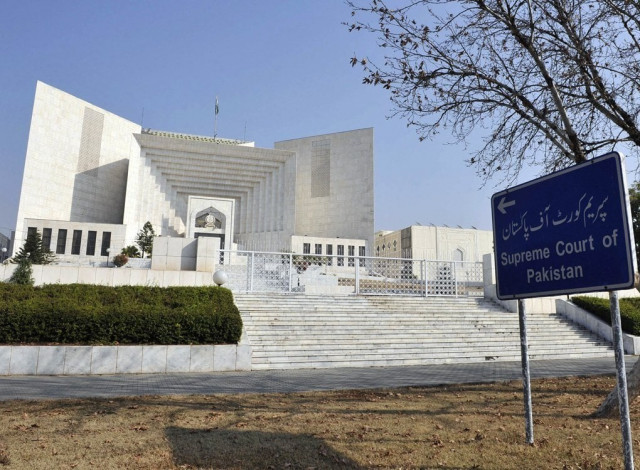SC ‘can review’ if law is flawed
Bench asks why parliament enacted legislation to benefit a certain group of people

A five-judge larger bench of the Supreme Court remarked on Monday that any law which had a flaw could be reviewed and asked why did parliament enact legislation for the benefit of a certain group of people.
The bench, headed by Justice Umar Ata Bandial, heard the case of reinstatement of employees who were dismissed under the Second Employees Act.
Justice Bandial asked whether those employees were recruited after tests and interviews. Lawyer Wasim Sajjad informed the bench that the recruitment was made through interviews, adding that newspaper advertisement was also issued in the process of the recruitment of subordinate staff.
Sitting on the bench, Justice Mansoor Ali Shah asked how the terminated contracts were restored after 11 years. Wasim Sajjad responded that the employees were reinstated by parliament, which concluded that those employees had been subjected to political victimisation.
Justice Shah then asked for the evidence of political victimisation and told the lawyer to explain to the court as to why only those employees were restored. He also said that there would be many more eligible employees in whose place they were restored.
The lawyer for the sacked employees replied that the court should review the debate that took place in parliament. He pointed out that these employees were middle-aged people, therefore, they had nowhere to go for fresh employment.
Wasim Sajjad said that if the government had made a mistake, the employees should not be punished. The court told the lawyer that he had not given a single argument to prove that the law was in accordance with the Constitution. Wasim Sajjad was then directed to submit his arguments in writing.
Read More: SC registrar challenges PIC order on staff details
Later, the lawyer of Intelligence Bureau (IB) employees, Aitzaz Ahsan, took the stand that the then caretaker government sacked those IB employees in 1996, adding that the caretaker government had no authority to dismiss them.
Justice Bandial said that the Supreme Court had already ruled in 2000 on the issue of caretaker government, and added that the case could not be reopened for another review, 21 years after the verdict.
Ahsan said that the Supreme Court in its decision misinterpreted the law about the restoration of the employee. He said that a caretaker government came and sacked several employees and added the act was not properly examined in the apex court decision.
Justice Shah said that the decision of the Supreme Court did not say that the employees of a particular party should be dismissed. He then asked why did the parliament benefit a certain group of people by enacting legislation.
Iftikhar Gilani, the counsel for the teachers, said that the Supreme Court itself had said that the legislation of parliament could not be annulled. Requesting the court to review its decision, he said that the wisdom of the legislators could not be challenged.
He argued that the Supreme Court must issue a notice to the attorney general for Pakistan before reviewing any constitutional or legal provision under the law. He added that no such notice was given in this case. Later, further hearing of the case was adjourned till Tuesday (today).



















COMMENTS
Comments are moderated and generally will be posted if they are on-topic and not abusive.
For more information, please see our Comments FAQ